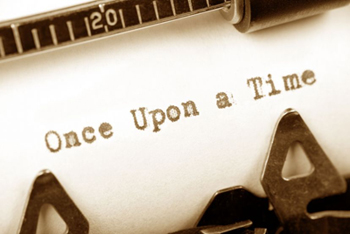Secrets of Great Presentations: Storytelling, Part II
Latest Posts
- 2024 Reading List for Leaders
(posted: 07/01/2024)The right book can be a leadership game-changer.
- Coach's Notebook: Exec Presence for Leaders
(posted: 05/08/2024)As a leader your charisma is critical. Learn how to develop it!
- New Year's Resolutions vs New Chapters
(posted: 02/01/2024)Forget New Year's...Your new chapter can begin when you are ready!
Blog Archives
Kristi posts to her site about once a month, but frequently more often. She also appears as a featured contributer on select other sites. If you would like to be notified when new blogs are posted, please subscribe to our newsletter.
If you are interested in Kristi guest posting to your site feel free to contact us.
Secrets of Great Presentations: Storytelling, Part II
(posted: August 6th, 2015)
Finding Your Own Stories for Presentations
 Great presentation and communication skills are the secret to holding people’s attention, making a persuasive point, being remembered and appearing competent and confident.
Great presentation and communication skills are the secret to holding people’s attention, making a persuasive point, being remembered and appearing competent and confident.
You may be giving a talk to an auditorium filled with people, or you could just as easily be asking your boss to give you a raise, hoping that a roomful of investors will back your new company or product, or convincing your friends to watch a specific movie. In all cases, your success comes down to how effectively you share your ideas in public. With some knowledge and some hard work, you can develop the skills to inspire people, get them interested, get them on your side and fire them up to take action.
In Secrets of Great Presentations we'll build your speaking skills step by step. In this post of the series we look at where to find stories for your presentations.
Listen carefully the next time you are out, at the coffee shop, on the bus or train, in the airport or even the grocery store, and you'll hear stories. Once you are looking for them, stories are all around you.
Many of my clients think that they don't have stories to tell, since they haven't achieved world recognition with a Nobel Prize, or experienced something dramatic, like hitting a grand slam in the World Series, or come from severe poverty to found and run a Fortune 500 company. But these kinds of stories, as big and dramatic as they are, are only effective when they contain elements that the audience can relate to. How many of us have hit a grand slam? By itself, that's not very relevant for most people. The good news is, my clients do have stories, and so do you. You just need to find them!
Shift Your Perspective
When we are trying to identify their stories, I often ask my clients questions about various times in their lives or about milestones and events that they may have experienced. Then we dig down to see what their memory reveals. Much of the time, all they need is a slight push to shift the way they view the things going on around them. When we start focusing on stories and storytelling, they suddenly see stories everywhere.
Think about the stories your family tells, perhaps about how your great-great grandparents came to this country, or how your parents met, or about you learning to drive. What about the stories that your company tells about its founders, its origins, and how it got to where it is today? Countries, religions, cultures all have stories. When you start looking, you've got your own stories to tell.
And what about everyday events unfolding around you? Again, if you are thinking in terms of storytelling, you can glean stories from your day-to-day observations and experiences, like mishearing something a friend said, or the insights that unfold from overhearing a snippet of conversation out of context while standing in line at Starbucks, or an observation you make about people and their dogs while you're on your daily run.
The Secrets to Finding Your Own Stories
So, you ask, how do I do this? How can I find stories?
There are a couple of different techniques that I like to use. For stories about your life, events and milestones, try asking yourself questions (or rope in a friend or colleague to do the asking). Some questions to use include:
- What was your very first job interview like?
- How about your first job?
- What were your biggest lessons from that first job?
- Who was your first boss? What was he/she like to work for?
- Who was the first person in your career who really believed in you?
- What was your first big promotion? Or your most memorable promotion?
- What job or company brings back the fondest memories for you? Why?
- What was one of your biggest challenges early in your career?
- Who is the best leader you've worked with? What did you learn from him/her?
- Who is the worst leader you workded for, and what did you learn from him/her?
If you have someone helping you, they can ask follow-up questions to guide your thoughts and memories further into your stories.
To gather stories about things, people, and events happening around you, pay close attention. This is where your shift in perspective is critical, because then you'll see everything as a possible story. A few situations you can mine for stories:
Odd Occurrences & Misunderstandings: When you think, "How odd (funny, weird, unusual) was that?" take notice! These moments can often be turned into stories. When a friend texts you and the autofill on her phone inserts a word that is almost right, but not quite, how can you use this as a story? Depending on the word and the usage, it might turn into a story about being present, or about expectations, or about trying to make things easier for people (with a service like autofill) but the end result is confusion, miscommunication, or even worse.
I Can't Do That or I "Know" it's True: Have you ever been sure you couldn't do something, only to try it and find that you could? Or believed something to be true and then been surprised to find it proven false? When drawn from your own experiences, or the experiences of those close to you, these are powerful stories. They are uniquely able to challenge limiting beliefs without making the listener defensive, because you are just telling a story, and it's about you, not them. It's easier to hear a message when it's illustrated by the speaker's own experience. This is also a great way to frame stories that are ultimately about your triumph or success, because it doesn't just showcase the success. It also illustrates your struggles, which is something we can all relate to.

Charming, Curious or Intriguing: When you find yourself charmed by a person or a situation, or curious about something, make note of it and take some time to look closely and dig deeper. Can this be used to illustrate a point? Is there a metaphor buried in it? Either in your curiosity and what it uncovered, or in the event itself? "Why do dogs bring the ball back, but refuse to give it back without a struggle after a few rounds of catch?" (Could illustrate a point about teamwork) "Look at the variety of colors on a late Fall day" (Could be a note about diversity, or how different personalities all combine to create a complete team).
A few more sources you might consider for your stories:
- Books that made an impact on you, altered your thinking or changed your world view
- Happy events from your life and what they meant to you
- Sad events from your life and how they shaped you and/or what they taught you
- Mistakes you've made, including what you learned from them and/or how you changed
- Funny or serendipitous events
Use these events to illustrate concepts and give your audience something meaningful to grab onto, something familiar and universal that they can relate to.
Write 'Em Down!
Once you shift your perspective and start finding your stories everywhere, it's important that you keep track of them. Don't expect to just remember them. Some people like to write their stories by hand in notebooks, others prefer to keep them in files on their computer. Some of us do both. When I'm out I keep a notebook with me and I write down the things that strike my fancy, sometimes just a word or two, other times with notes to myself about how I might use what I've found. When I get back to my desk I transfer them into my story file, often fleshing them out a bit in the process.
You'll also probably want to break them into categories. You may start very generally, with something like "Personal" and "Work" and as your collection grows you might expand to include things like "Mistakes" "Sad" "Happy" "Funny" "Firsts" and so on, anything that helps you find a story when you need it.
Whether you choose one of the above methods, or find a completely different one, commit to keeping track of your stories!
Stories make up the fabric of our lives, weaving our experiences together and connecting us to each other. In my next post I'll talk about how to use your stories in your presentations. In the meantime, as you start gathering your stories, think about how you might use them, and how they could help illustrate the points you need to make.
- Which method are you going to try to help you identify your stories?
- What strategies have you used for collecting stories that I haven't mentioned?
- What is your favorite personal story to use in presentations? Business story?
Read the Secrets of Great Presentations Series
- Part 1 - Understanding Your Audience in 5 Steps
- Part 2 - Secrets of Great Presentations: 6 Ways to Structure a Compelling Talk
- Part 3 - Secrets of Great Presentations: Storytelling Part I
- Part 4 - Secrets of Great Presentations: Storytelling Part II
Sign Up for our monthly newsletter and never miss another post.
